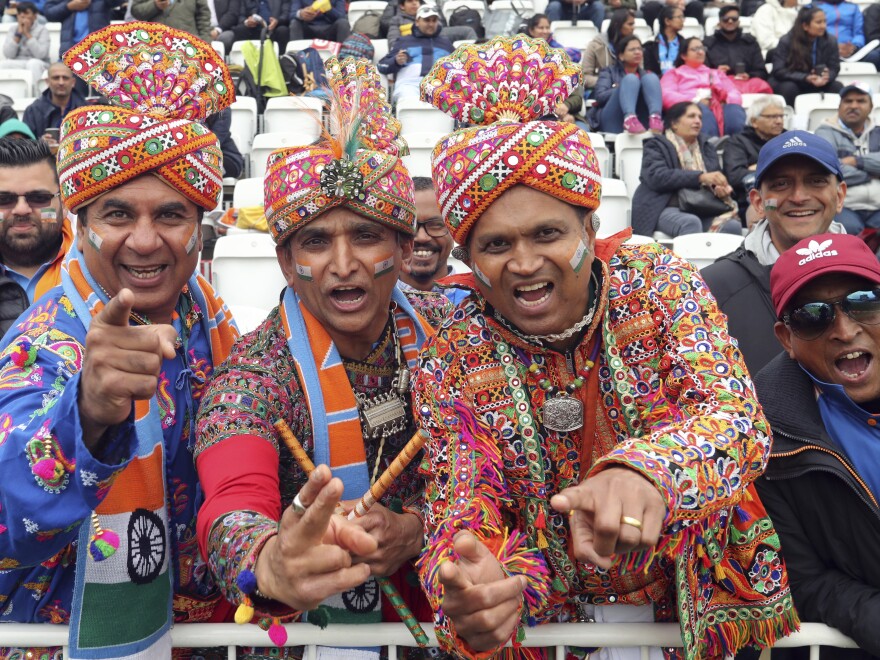Pakistani TV shows a bloodied Indian fighter pilot in captivity, sipping tea while being interrogated. He addresses his captor as "sir." But he refuses to divulge any information.
This happened back in February, when Pakistan shot down an Indian fighter pilot, interrogated him and filmed it amid an exchange of airstrikes that brought these nuclear-armed neighbors close to all-out war. The pilot was released home to India in what Pakistan's prime minister called a "peace gesture."
Now there's a spoof of his interrogation video. An actor plays the Indian pilot, with his signature handlebar mustache and holding a teacup. But this time, it's not India's military strategy the Pakistani interrogators are after. It's India's game plan for the ICC Cricket World Cup.

The video is an ad produced by Pakistan's Jazz TV, a TV streaming app, ahead of what's likely to be the most-watched World Cup match: India vs. Pakistan. The arch-rivals will meet Sunday in Manchester, England. The tournament, held every four years, is being played this time across England and Wales.
People across South Asia are throwing cricket-watching parties and the projected global TV audience for this, one of the world's biggest sports rivalries, is expected to exceed 1 billion.

In the past, India-Pakistan cricket has sometimes presented an opportunity for diplomacy. In 2005, after watching their countries play a match in New Delhi, Indian Prime Minister Manmohan Singh and Pakistani President Pervez Musharraf declared the peace process between their two nations to be "irreversible."
Three years later, Pakistani militants attacked Mumbai, and the peace process floundered. After the two countries resumed talks in 2011, their prime ministers met to watch their national teams compete in the cricket World Cup semifinal in India.

Not all efforts at diplomacy via cricket have been successful. In 1991, Hindu extremists dug up the cricket field at Mumbai's Wankhede Stadium to prevent Pakistan's national team from playing there. The series of matches had to be canceled.
One of the legendary tales of cricket diplomacy dates back to 1987: It was reportedly in the stands of a cricket match that year in Jaipur, India, that Pakistani dictator Gen. Muhammad Zia ul-Haq whispered to Indian Prime Minister Rajiv Gandhi that Pakistan had developed a nuclear bomb.

Ahead of the last World Cup, in 2015, Indian Prime Minister Narendra Modi phoned then-Pakistani Prime Minister Nawaz Sharif to wish him luck. (India won the match). But this time around, there's been no phone call to Pakistan's Prime Minister Imran Khan, himself a cricket legend who captained Pakistan's team to its only World Cup victory, in 1992. (India has won twice, in 1983 and 2011).
Modi was re-elected last month in part by talking tough and launching airstrikes against Pakistan in February. Khan has requested peace talks, but Modi has so far refused. This World Cup also coincides with the 20th anniversary of the last India-Pakistan war, at Kargil in 1999. Still, many spectators and fans on both sides of the border prefer to think optimistically.
"As a sportsman, [Khan] used to be very nice and pal around with all the Indian players," recalls Mumbai resident Parag Grewal, 46, who grew up watching Khan play cricket. "Now also he can be that arbitrator, who can defuse the situation and get a little more brotherly love."

Sunday's match "should create love and affection. We are the same people," says Ayub Malik, 55, at a busy market in Islamabad, Pakistan's capital. "We should compete, but compete for the betterment of society — and cricket is one instrument of that."
So far, this year's cricket rivalry has generated more spoofs and memes than diplomacy. Twitter is awash with memes of teacups and trophies.
Near the end of the spoof interrogation video that's been airing in Pakistan, the actor playing the Indian fighter pilot tries to leave with his teacup. The Pakistani interrogator stops him.
"Where do you think you're going with that cup?" he demands, yanking it back — an allusion to the World Cup.
The video plays out with a hashtag: #LetsBringTheCupHome.
NPR producer Sushmita Pathak contributed to this report. contributed to this story
Copyright 2023 NPR. To see more, visit https://www.npr.org.




